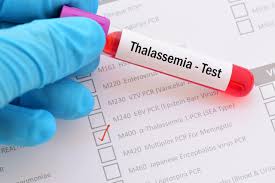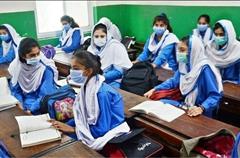In a significant move toward improving public health outcomes, the Punjab Assembly has introduced the Thalassemia Prevention Act 2025, requiring all students to undergo genetic testing before gaining admission into educational institutions. This groundbreaking legislation is designed to tackle thalassemia and other inherited disorders through early detection and management, and it applies to both public and private schools, colleges, and religious seminaries across Punjab.

Key Aim: Combat Thalassemia and Genetic Illnesses Through Prevention
The primary purpose of this law is to curb the rising cases of thalassemia and related genetic conditions by enforcing early diagnosis. Through compulsory screening, the government hopes to identify carriers and patients before they develop serious symptoms, enabling timely medical intervention and reducing the long-term healthcare burden.
Who Needs to Get Tested?
Under the act, every student applying for admission to any type of educational institution in Punjab must undergo tests for:
-
Thalassemia minor and major
-
Other hereditary and genetic disorders
These test reports must be submitted with the admission application. Institutions are required to ensure that no student is enrolled without providing the necessary medical screening results.
Monitoring and Data Collection by PITB
The Punjab Information Technology Board (PITB) has been entrusted with maintaining a secure, centralized digital repository of all submitted test results. This step is intended to create a comprehensive and accurate record of genetic health trends within the province.
Key roles of PITB include:
-
Storing medical records securely
-
Preventing unauthorized access or misuse of data
-
Tracking submissions by laboratories to ensure timeliness and accuracy
Laboratories are expected to submit the test reports within 10 days. Any breach of data privacy, submission of fake results, or manipulation of records will lead to strict legal action under the Pakistan Penal Code.
Legal Responsibilities for Laboratories
The law introduces a zero-tolerance policy toward falsified reports or leaks of personal data. If any laboratory or staff member is caught sharing confidential information or tampering with reports:
-
They will face criminal prosecution
-
They may lose licenses or certifications
-
Heavy fines or imprisonment could be imposed under the law
Only authorized and approved laboratories will be permitted to conduct these genetic tests, ensuring the accuracy and reliability of medical data.
Formation of an Advisory Council
To supervise the proper execution of the Act, a Genetic Health Advisory Council will be formed. The council will include:
-
Medical professionals
-
Government health officials
-
Education sector representatives
This body will be responsible for guiding the implementation strategy, reviewing progress, and recommending updates based on new medical research.
Support for Diagnosed Students
For students found to be affected by genetic conditions, the government plans to offer several types of support services, including:
-
Counseling and psychological support
-
Referral for specialist care
-
Assistance in managing educational challenges
Importantly, the law also mandates that these students should not face discrimination in education. Institutions are required to provide necessary accommodations for students with special health needs.
Free Testing for Low-Income Families
Recognizing the financial strain medical tests can place on underprivileged households, the government has committed to offering free genetic screening services for students from economically disadvantaged backgrounds. This move ensures that no child is left behind due to affordability issues.
Linking with NADRA for Health Data Management
Another crucial part of the law includes the registration of affected individuals with NADRA. This will help create a verified national record of people living with genetic conditions, aiding in future policy planning and the distribution of healthcare benefits or financial aid.
What Educational Institutions Must Do
All academic institutions in Punjab—whether public, private, or religious—must now:
-
Make genetic screening mandatory for admissions
-
Coordinate with recognized laboratories
-
Educate students and parents about the importance of early detection
-
Ensure data privacy is upheld at all times
Institutions that fail to follow these guidelines may face legal and administrative action, including fines or loss of registration.
Legislation Status and Implementation Timeline
Although the Punjab Assembly has approved the Act, it still awaits formal assent by the Governor of Punjab. Once the Governor signs it, the law will be enforced immediately across the province. The Education Department is preparing to roll out awareness campaigns and help institutions comply with the new regulations.
A Game Changer in Public Health Policy
Pakistan faces a high prevalence of thalassemia, with thousands of children diagnosed annually. Most patients require lifelong treatments, including regular blood transfusions and medications—burdens that not only affect families emotionally but also strain public healthcare resources.
With this preventive legislation, Punjab aims to:
-
Minimize new cases through early identification
-
Encourage informed family planning
-
Enhance the overall health profile of the population
This shift from reactive treatment to proactive screening represents a major evolution in healthcare governance.
The Punjab Thalassemia Prevention Act 2025 signals a proactive approach to tackling hereditary diseases in the province. By requiring students to undergo genetic screening at the time of admission, the government is prioritizing prevention over cure. With a robust framework for data protection, free testing for the needy, and support for affected individuals, this law sets a powerful example for genetic health management in Pakistan.
Educational institutions, healthcare providers, and families are all vital players in this initiative. With collaborative efforts and responsible implementation, Punjab is set to become a model province for genetic disease prevention and student health welfare.
Explore Educational News
Related News

Punjab Increases Registration Fee for Matric









.gif)



























